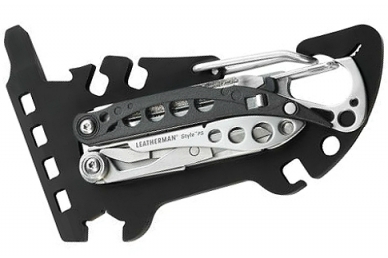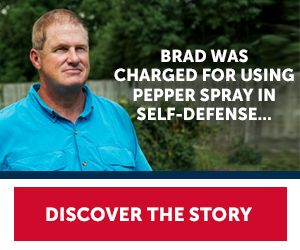When I was searching for my next addition to my multi-tool collection, I stumbled upon these things called Pocket Tools.
What is the difference between a multi-tool and a pocket tool?
What is the difference between a multi-tool and a pocket tool? The easy answer is, while multi-tools have many moving parts, pocket tools tend to take a minimalist approach in design with few, if any moving parts, but still provide many useful features and tools.
Pocket tools have often been lumped in with multi-tools as a sub-category, but they do have some obvious differences and how they fit into peoples every day carry systems, makes me believe that a dedicated category really was necessary.
There are endless numbers of multi-tool and pocket tool designs available today. Many more than I could ever list here. Also, most companies that make multi-tools also make pocket tools as well. Many of the examples I will use, will be from the more common brand names like Gerber, Leatherman, CRKT, and Griffin. Not to disparage other brands, but there are just too many to cover them all here.
WHAT IS A MULTI-TOOL?
Multi-tools come in many different forms, but for this discussion
If you want a single tool that can help you perform many
Key Features of Multi-Tools
One of the main features of a multi-tool has to be the pliers. Pliers seem to be the cornerstone of the modern multi-tool since Leatherman’s first design. Whether they are slide-out pliers, like Gerber’s design or butterfly opening like Leatherman’s original Pocket Survival Tool, a good solid multi-tool will generally have pliers.
Using the pliers as a base to work from, a multitude of tool options are added, to fill the space in the handle not taken up by the pliers when the tool is in its closed position. The larger the pliers, the larger and more robust the multi-tool becomes. The larger the multi-tool is, the more tools can
The Multi-Tool Advantage
One of the main advantages that multi-tools have over pocket tools is the large selection of tools available. Because of the inherent size of multi-tools, they can support more options and larger tools as well. With the use of larger tools, it allows for the tool design to more closely approximate the actual tool type that it is trying to replicate.
There are two main attributes that multi-tools have, that you will not find in pocket tools. The first is pliers, adding pliers makes the tool too big and bulky to be classified as a pocket tool and it gives the multi-tool a lot more capabilities as well. The second thing is a blade, as there are different types of blades you can have on a multi-tool. Generally, the only type of blade you will find on a pocket tool is a low profile emergency cutter like a seat belt
The Multi-Tool’s Greatest Weakness
The multi-tools biggest advantage is also its biggest weakness, its size. More tools equal’s more size and weight. When you add size and weight, the multi-tool becomes more difficult to carry in your pocket. Even with the addition of pocket clips to many multi-tools, they are still too big and bulky for many to carry daily. For my favorite small and lightweight multi-tools
(click here check out my Recommended Tools page: Best Lightweight’s for EDC)
For blue collar guys and gals, carrying a belt-mounted sheath is fine, but it’s harder when you have to wear a button-down shirt with a tie and khakis. Then carrying a larger multi-tool is not really an option.
Choosing The Right Multi-Tool
There is more to choosing the right multi-tool than meets the eye. With a myriad of options to choose from, it’s impossible for me to tell someone what the best tool for them would be. Everyone’s wants and needs are different. All I can do is point someone in a general direction.
WHAT IS A POCKET TOOL AND HOW IS IT DIFFERENT?
So what is a pocket tool you ask? Generally speaking, pocket tools are made from a single small, low profile piece of sturdy material and include a small selection of features. There are some pocket tools that do stray from this basic form factor, these are usually specialized pocket tools that are made for a very specific purpose.
The Big Advantage Of The Small Pocket Tool
One of the main advantages pocket tools have over multi-tools is the fact that they are so small and lightweight. This makes them super easy to add into your EDC system. Some have clips or other ways of attaching them to your keys or belt loops or you can just slip them into your pocket and they disappear un-noticed until needed.
The Disadvantages of Pockets Tools
The idea of having a small lightweight multi-tool comes at a cost. As with multi-tools, the pocket tools biggest advantage becomes its greatest weakness. Because of its small size, it has limited capabilities. To keep the tools small and light it has fewer tools and has to be more specialized to a particular need.
Choosing The Right Pocket Tool
It’s important when choosing a pocket tool for yourself, to evaluate what your most commonly needed tool will be. There are some other questions you will have to ask yourself. Do you need a general purpose pocket tool or a special purpose pocket tool? Do you want it made from stainless steel, titanium or aluminum? Does it provide a solution to the problem you’re trying to solve?
General Purpose Pocket Tools: There are endless numbers of general purpose pocket tools, all with their own styles and combinations of tools and features. Choosing a general purpose tool is not the easiest thing to do. The best method I have found for finding a good pocket tool is not very scientific, it consists of browsing through a number of options until you see one that catches your eye. When you see it you will know it has the options you want, it’s just that simple. If it looks like it has what you are looking for go for it.
Special Purpose Pocket Tools: There are several companies that make purpose-built pocket tools. Leatherman and Gerber both make purpose-built pocket tools for people into archery, shotgun sports, and AR-15 shooters. Leatherman also makes pocket tools for people into snowboarding, skateboarding, and surfing too.
CONCLUSION
Multi-tools and pocket tools both have their place in the EDC world. They both serve their roles, by allowing people to have the tools they need on their person in the most convenient package possible. Some people need a robust tool to perform heavy duty tasks. Others just need a simple tool for simple tasks. There is something for everyone.


